
 nvisioning the future is not an easy endeavor. For one brave (or crazy!) enough
to attempt it, he or she might end up looking like a genius if correct (hopefully
during their lifetime) — or a colossal fool (preferably posthumously) if
proven wrong.
nvisioning the future is not an easy endeavor. For one brave (or crazy!) enough
to attempt it, he or she might end up looking like a genius if correct (hopefully
during their lifetime) — or a colossal fool (preferably posthumously) if
proven wrong.
Of course we at Phrenicea hope for the former, but we are not afraid to stick our
necks out and put ourselves at risk for the latter.
To ensure an adequate air of skepticism is maintained when viewing this site, we
will present here the first of what we hope will be many predictions gone
wrong — very wrong.

Oops!
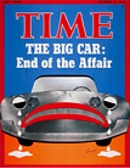 THE BIG CAR: End of the Affair
THE BIG CAR: End of the Affair
"Lately, there have been multiplying signs that the long American romance with the big
car may finally be ending.
"A small, unostentatious car will be the workhorse for commuting and shopping.
Car pooling will have to increase, despite massive psychological resistance to it. The one-occupant-per-car
habit is simply too expensive to be continued. The heavy car will linger as a limited-purpose,
special-use auto, but not again become the basic American vehicle."
 TIME magazine, December 31, 1973
TIME magazine, December 31, 1973

Oops!
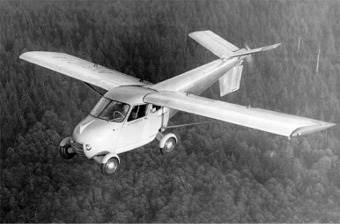 Flying Cars are Here!
Flying Cars are Here!
"You can buy an Aerocar today and become a pioneer in one of tomorrow's most exciting forms of
travel. Cost of the first few vehicles is high, but watch cost drop as production climbs!"
 Motor Trend magazine, December 1951
Motor Trend magazine, December 1951
Click here to read all about
it!

Oops!
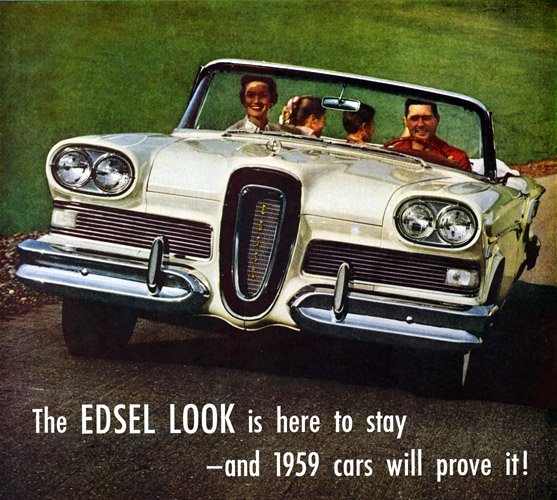 "The EDSEL LOOK is here to stay —
"The EDSEL LOOK is here to stay —
— and the 1959 cars will prove it!"
 - EDSEL sales brochure
- EDSEL sales brochure

Oops!
On the Beatles:
"The only thing different is the hair, as far as I can see.
I give them a year."
 - Ray Bloch, musical director,
"The Ed Sullivan Show"
- Ray Bloch, musical director,
"The Ed Sullivan Show"

Oops!

 Non Sequitur © Wiley Miller. Dist. by uclick. Reprinted with permission. All rights reserved.
Non Sequitur © Wiley Miller. Dist. by uclick. Reprinted with permission. All rights reserved.

Oops!
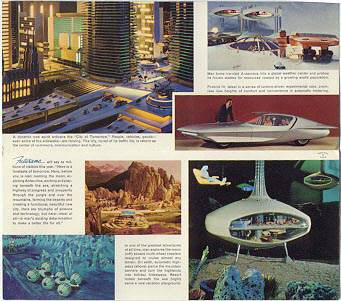 Welcome to Futurama!
Welcome to Futurama!
"Welcome to a journey into the future — a journey for everyone today, into the everywhere
of tomorrow..."
General Motors' futuristic pavilion — Futurama — at the 1939 New York World's Fair, was a huge hit. So when
New York again hosted the fair in 1964, GM went all out with the fabulous Futurama II exhibit, arguably
the best attraction at the fair.
For those lucky enough to experience the ride, it showcased a utopian-like
vision of the future using incredibly detailed, miniature working models. The vision was based not on Man's good will or
worldwide political harmony, but on omnipotent technology.
Here's a sampling of fanciful prose from GM's vivid brochure shown here:
- "A dynamic new spirit enlivens the "City of Tomorrow." People, vehicles,
goods — even some of the sidewalks — are moving. The city, cured of its
traffic ills is reborn..."
- "Man turns ice-clad Antarctica into a global weather center and probes its
frozen wastes for resources needed by a growing world population."
- "...[T]urbine-driven environmental cars, promise new heights of comfort
and convenience in automatic motoring."
- "On earth, automatic highways pierce the mountain barriers and turn the
highlands into holiday hideaways. Resort hotels beneath the sea serve a new
vacation playground."
Now that your appetite for "all things future" has been technologically whetted,
take a vicarious trip through the Futurama exhibit by
clicking here! Read the entire
transcript of the audio narration accompanying the ride. Listen to a recording of
an actual ride through the exhibition hall. Let your imagination take you
to a world that was supposed to be here by now!

Oops!
It appears getting listed on our "Oops" list has struck fear into some:
"Nobody knows. I don't make any assumptions about the future."
 - Scott McNealy,
CEO of Sun Microsystems
- Scott McNealy,
CEO of Sun Microsystems

Oops!
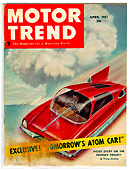 Atomic Power! — in your car...
Atomic Power! — in your car...
"Some day, the atom, or one of its currently little known by-products, may even drive your own personal
car! Does the idea sound fantastic?
"Many scientists predict that nuclear fission will be the source of power which drives all productive
tools in the auto factory of the future. There is no doubt in the minds of those engaged in atomic
research today...
"A professor of mechanical engineering at the University of Michigan, who asks to remain nameless,
believes that some day atomic cars will be commonplace. In fact the illustration on the cover of this
issue of Motor Trend is based upon his vision of such vehicles. To him, the fact that horses
and buggies gave way to gasoline-powered cars during his lifetime is proof enough that atomic cars are
in America's future.
"The professor dreams of a day when each automobile customer will receive a 'bound box of fissionable
stuff together with pills that will create enough energy to last the life of the car.'
"So, on this April day of 1951, who is to say whether an atom car is desirable, practical, or feasible?
A few decades ago who would have said that the automobile was feasible?"
 Motor Trend magazine, April 1951
Motor Trend magazine, April 1951

Oops!
 2001's HAL Computer!
2001's HAL Computer!
"I am a HAL 9000 computer, production number three. I became operational at the HAL plant in Urbana
Illinois on January 12th 1997"
 Arthur C. Clark, 2001: A Space Odyssey
Arthur C. Clark, 2001: A Space Odyssey
Way back in 1968, all sorts of futuristic scenarios were painted with a broad brush of technological optimism.
2001: A Space Odyssey was sophisticated science fiction based on the predictions of respected
scientists. Computers with human-like abilities did not seem out of reach.
Today's scientists have become humbled, still unable to create a
computer that can do anything more than process preprogrammed instructions at lightning speed.
Declares North Carolina State University's Robert Rodman:
"HAL's level of achievement has not been attained. To make a computer
intelligent enough to pick up the real complexities of human speech...
that's going to be pretty hard to do. I'm not sure it'll ever be possible."

Oops!
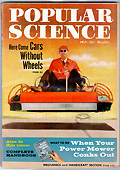 Here Come Cars Without Wheels!
Here Come Cars Without Wheels!
"You'll ride low and fast on a bubble of compressed air, in fantastic new 'sleds.' They whoosh across
fields, swamp, water — anywhere — at speeds that could match airplanes."
"Imagine a car without wheels,RealityCheck!
skimming four feet off the ground across roadless terrain. They slide on
compressed air blasted down by a propeller. Freed from friction with the ground underneath, they zoom
forward at airplane-like speeds.
"They threaten to turn transportation inside-out, giving you a sports car, speedboat, half-ton truck and
back-pack helicopter all rolled into one. There is no restriction on speed. The designers are thinking about
150 mph over water, 500 mph over land.
"And the big thing: It should be cheap. A breakthrough like this could shake up living patterns here and
everywhere else. Any stream or stretch of open country becomes a highway, any beach a harbor. Lonely farm
families will get to town, winter and summer, as easily as if they lived alongside the freeway. Commercially,
the deep-water harbors that are great port cities' richest assets would be obsolete."
 Popular Science magazine, July 1959
Popular Science magazine, July 1959

Oops!
Deep Doo-Doo!
"Some apocryphal Victorian, so the story goes, looked at the rate at which the number
of horses on city streets was increasing and assured his peers that
their capital would soon be knee-deep in horse manure. He got it wrong, largely because
he failed to predict the imminent rise of the automobile. That brought its own problems,
of course, but the point was that Victorians were blindsided by the future — which, as
any would-be Cassandra soon learns, is seldom what it appears to be."
 TIME magazine, April 2000
TIME magazine, April 2000

Oops!
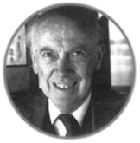 Even a famous biology legend and Nobel laureate, often referred to as the father of modern genetics,
can become the subject of controversy upon trying to predict the future:
Even a famous biology legend and Nobel laureate, often referred to as the father of modern genetics,
can become the subject of controversy upon trying to predict the future:
"Potential therapies called angiogenesis-inhibitors hit the news in a big way [in May of 1998] when DNA-codiscoverer
James D. Watson predicted that their inventor, Judah Folkman, would
'cure cancer in two years.'
Alas, cancer is still with us."
 Scientific American magazine, December 2001
Scientific American magazine, December 2001

Oops!
So why is everyone still working so hard?
Nobel laureate and artificial intelligence expert, Herbert A. Simon (1916-2001) of Carnegie Mellon University,
winner of the A.M. Turing Award and the National Medal of Science and many other awards for his work in
cognitive psychology and computer science, research ranging from computer science to psychology,
administration and economics; considered to be a founder of the field of artificial intelligence, declared in 1965:
"[By 1985], machines will be capable of doing any work Man can do."
Gee, this kind of arrogant optimism sounds familiar. Today's inflated predictions
center around computer technology. To learn about one of Simon's most galling
contemporaries, Ray Kurzweil, visit "Chiphead."
History does repeat itself!

To be continued...






Chronicling the Future®

Use of this website
constitutes acceptance of the Phrenicea® Terms and Conditions.

This page belongs to
www.phrenicea.com
Entire site ©2000-2011 John Herman. All rights reserved.

 THE BIG CAR: End of the Affair
THE BIG CAR: End of the Affair
 Flying Cars are Here!
Flying Cars are Here!
 "The EDSEL LOOK is here to stay —
"The EDSEL LOOK is here to stay —

 Welcome to Futurama!
Welcome to Futurama!
 Atomic Power! — in your car...
Atomic Power! — in your car...
 2001's HAL Computer!
2001's HAL Computer!
 Here Come Cars Without Wheels!
Here Come Cars Without Wheels!
 Even a famous biology legend and Nobel laureate, often referred to as the father of modern genetics,
can become the subject of controversy upon trying to predict the future:
Even a famous biology legend and Nobel laureate, often referred to as the father of modern genetics,
can become the subject of controversy upon trying to predict the future: